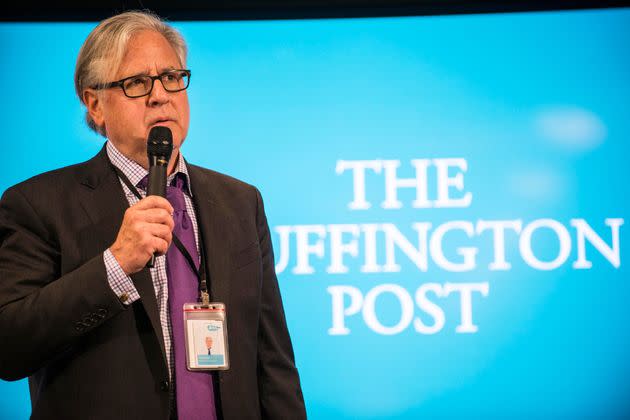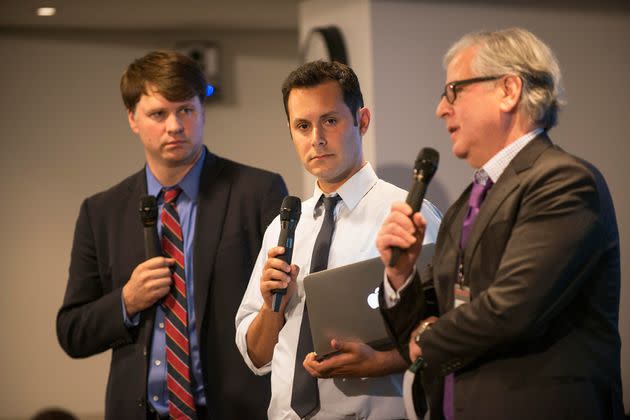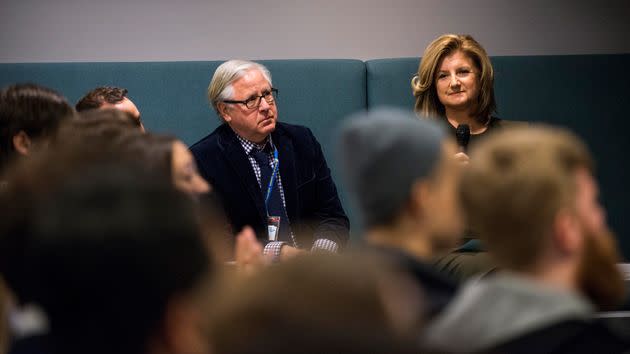‘A Force Of Nature’: Remembering HuffPost’s Howard Fineman

Howard Fineman, the longtime Washington scribe who mastered a multitude of different mediums over the course of several distinguished decades in journalism, died Tuesday evening at 75 after a two-year-long fight with pancreatic cancer. The news was announced by his wife, Amy Nathan.
Howard was likely a familiar figure to you all. Not only was he a ubiquitous presence on MSNBC and a prolific writer for Newsweek magazine during its golden age, but he also played a prominent role at HuffPost, having served as the site’s global editor for a time.
Global is a good way to describe Howard. He had a gravitational pull about him. He was a man in perpetual motion, reporting and writing and pundit-ing — seemingly unsatisfied unless he was contributing to the day’s conversation.
“I’ve gone from the manual typewriter to Twitter,” he told me of his career when we spoke for this piece. “I’ve done everything but skywriting.”
Stricken with terminal cancer, he said he’d try it in his remaining time. It was a joke, of course. But at that moment, it wasn’t hard to envision him up in the plane. There were few stories he wouldn’t chase.
I first met Howard as a researcher for his book, “The Thirteen American Arguments.” It was a lofty project, trying to distill roughly 250 years of history into an arbitrary number of neatly tailored, binary disputes. He would confide later that it was “classically overwrought.” Nonetheless, it was a best-seller.
From there, Howard played an outsized role in my professional life, helping me get into the Columbia University Graduate School of Journalism (where he had also gone) and Newsweek’s internship program. He then joined me at HuffPost, where I served as politics editor at the time.

Despite all that overlapping history, it was in the years after we both left HuffPost that we grew closer. Bumping into him around the neighborhood or sitting over coffee, I developed an immense fondness for Howard. He was a mensch in the truest sense. He loved mentoring younger reporters, and we, in turn, grew attached to him.
I began to recognize that this person who I had, for so long, seen as an emblem of the D.C. establishment was, in fact, discomforted by it. He wanted to witness history, not be a part of it. He had gone into journalism because it let him scratch his curiosities and (like so many in the field) channel his insecurities. He had a virtuous view of the line of work. I’m not sure he could have enjoyed anything else.
“I’m not the world’s most social person by nature,” he told me. “The way I could square being an outsider and being part of the human race was by being in a newsroom.”
Howard was born on Nov. 17, 1948, in Pittsburgh, Pennsylvania. His mother was an English teacher, and his father was a shoe company manufacturer’s representative. From an early age, it was clear the career path he’d chart.
On election night in 1956, he, an 8-year-old, converted the den of his home into a makeshift newsroom where he broadcast the results to his parents and laid out piles of paper to look like the cards the networks fed into their rudimentary computers.
“It was really one of the nerdiest things you could imagine,” Howard recalled.
He attended Colgate University, where he was the editor-in-chief of The Colgate Maroon, and graduated from the Columbia Journalism School in 1973. From there, he went to The Courier-Journal in Louisville, Kentucky.
A Jewish kid from Squirrel Hill may have seemed like an odd fit for bourbon country. But the paper would be the spiritual tent pole of his career. Southern politics was unnerving — he covered a Klan rally during the day because his editor forbade him from doing so at night — but it had its undeniable charms. A “porchfront style,” as he put it, that was ripe for “storytelling.”
“In many ways, that was the best,” he said of his Louisville days. “The irony is for many reporters back then who were hungry to come to Washington they didn’t realize how lucky they were. It was wonderful, and I loved every minute of it.”
I always wondered why Howard didn’t just stay in Louisville, given the sentimentality he felt for his time there. But he flicked away such hypotheticals like pesky gnats. D.C. was his goal. He saw the city as “an imperium not unlike Rome,” where “all the vectors of power in the country intersect.” And he wanted to be at that intersection.
In 1977, he joined the Courier-Journal’s Washington bureau and, within three years, was at Newsweek. His trajectory continued from there: labor reporter, political correspondent, chief political correspondent, senior editor, and then deputy Washington bureau chief.

To chart that path required obvious skill, and Howard certainly had that. But it also required a bit of professional ferocity too. Colleagues described an intensity to Howard that I saw later in his career. He wanted to have the best Rolodex and the best assignments. He had a well-known competitive streak that fed his work ethic. He labored late into the night to practice for TV hits the next morning. And he litigated everything — a byproduct of the law degree he had earned taking night classes at the Brandeis School of Law at the University of Louisville.
“He was a force of nature,” recalled Jonathan Alter, his colleague for years at Newsweek. “He knew everybody in Washington. He not only knew them but had a sophisticated take on who they were and what they were doing. He was extraordinarily politically shrewd.”
But Howard also benefited from larger, tectonic changes in the media industry. News magazines were elevating their correspondents into bonafide must-reads. Broadcast news was turning to younger on-air talent. Watergate had given reporting moral virtue and real celebrity.
“I went into Columbia wanting to be Teddy White and came out wanting to be Woodward and Bernstein,” Howard told me. “They had saved, one might argue, the American constitutional government. And they became famous also, let’s say that.”
Howard continued moving with those tectonic shifts: becoming one of the most recognizable pundits on cable news and then joining the online journalism wave right as it was peaking. But he had — what seemed to me, at least — a complicated relationship with that concept of fame. I asked him once if he had been motivated by it.
“If you do that to me, I’m going to come back from the grave and kill you,” he shot back. Minutes later, he acknowledged the appeal.
For Howard, the discomfort was not in the fame he had rightfully achieved but in the suggestion that he had moved on from his Pittsburgh roots and Louisville molding for something facile.
In our talks, he repeatedly described himself as an “outsider.” It was not lost on him that Newsweek was the scrappy underdog next to the Time and that HuffPost was the renegade among its peers. He took pride in those fits. And he was critical, too, of reporters who didn’t share his conviction that the profession was not part of power but a check on it.
“In Washington,” he said, “we delude ourselves as journalists into thinking we are part of the establishment. We really, ultimately, are not.”
It was for this that I came to not just appreciate Howard but love him. He was righteous about the right things and dogged in the right ways. He had big thoughts and surprising depths. He had a value system in an industry and town where that can often get lost. Of all the pieces he wrote, the presidents he’d interviewed, and the places he’d been, it was his reflection on the shooting at the Tree of Life synagogue — where he’d been bar mitzvah-ed — that he regarded as his best work.
He never truly left that den in his home in Pittsburgh.
I will miss my friend. But, more importantly, we in political journalism will miss the example he set. Goodbye, Howard.

